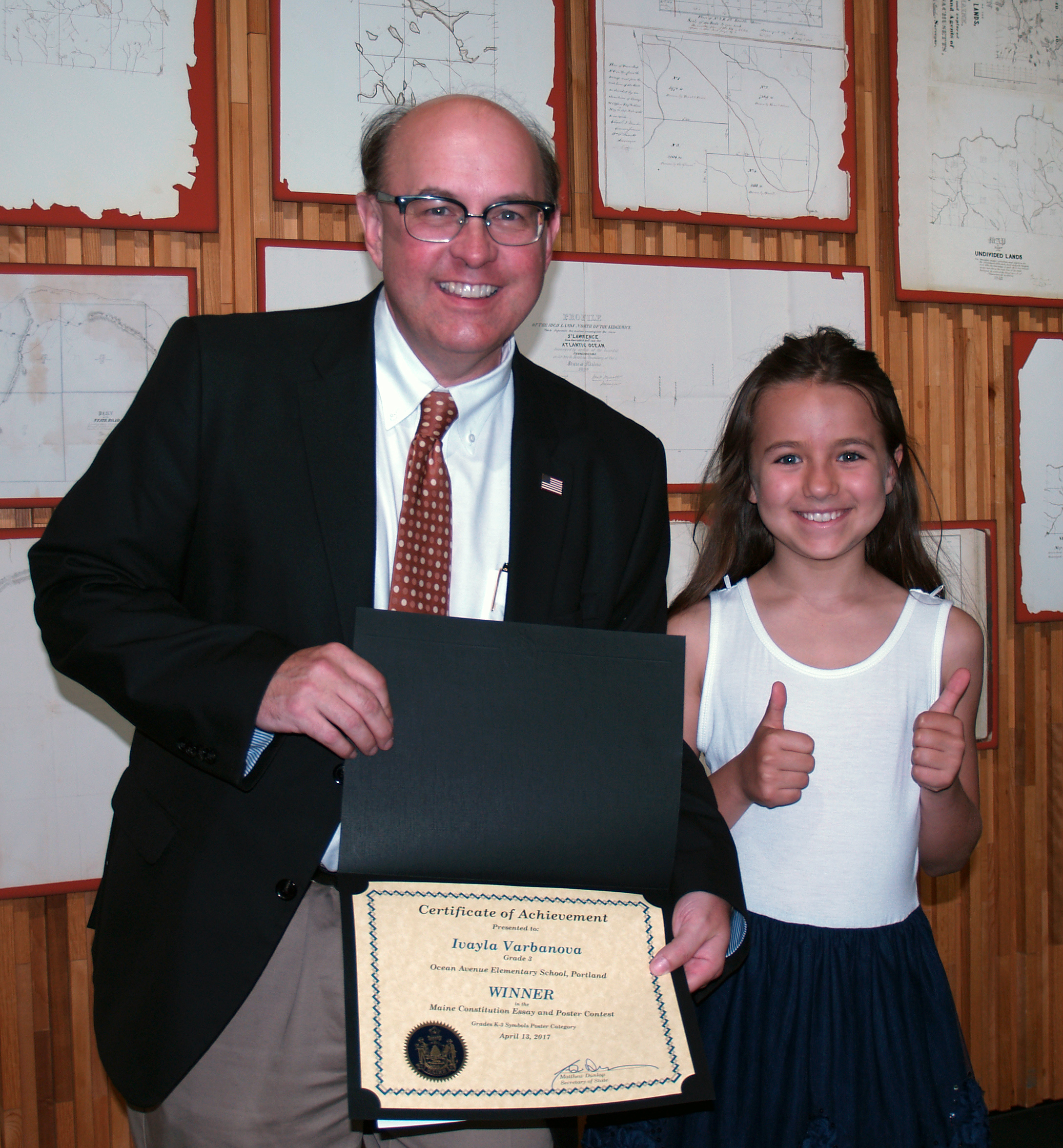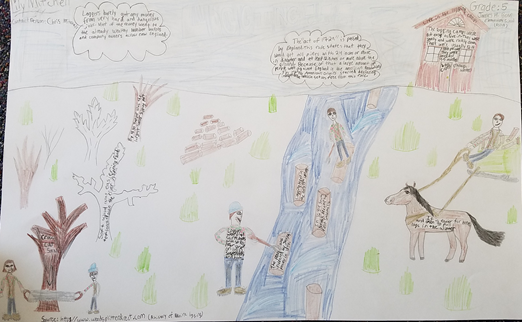
Poster Contest Winners
Ivayla Varbanova
3rd Grade - Ocean Avenue Elementary School, Portland
Lily Mitchell
5th Grade - James H. Bean Elementary School, Sidney
Constitution Essay Winner

Karen Desmond
8th Grade - Highview Christian Academy
"My Home"
Maine forms the Northeastern corner of the United States. On a map, it juts out like a jabbing thumb or wedge between the Canadian provinces of Quebec and New Brunswick. Mainers are the first Americans to see the sun rise. West Quoddy Head, a small Maine peninsula, is America’s easternmost piece of land. Nearby Eastport lies farther east than any other American city. Maine is a fitting place for America’s day to start because of its ideals like freedom, truth, justice, individualism, and equality. These are deeply rooted in Maine.
These ideals have helped Mainers carve a special life from its jagged rocks and cliffs and its thousands of bays and inlets on its coast. Inland, there are sparkling lakes, rushing rivers, green forests, and towering mountains. Most Mainers could not imagine living anywhere else. They are proud to call Maine their home.
Besides this, Maine is a friendly and independent state with a small-town feel. Here, at an early age, you learn and participate in your community. If someone needs help, you help out. Mainers take responsibility for people, young and old, around them. Neighbors are important.
Helping to preserve Main’s great way of life is its constitution. Following the War for Independence, Maine’s growing population wanted self-rule or statehood. Mainers wanted to be free from Massachusetts and make their own decisions through their own government. Mainers wanted a separate state.
The reasons for separation were many. The Massachusetts government was too far away. In the War of 1812, Massachusetts ignored attacks on Maine towns by the British. As a state, Maine could build its own army to protect itself. Maine interests were not the same as Massachusetts interests. The costs of traveling to court in Boston were high. This distance also caused a delay in solving problems and administering justice. Other Mainers believed Massachusetts taxes were too high, and Maine did not have enough representatives in the Massachusetts legislature.
Mainers were faced with the difficult task of creating a just and responsive state government. Drafting a constitution would be the first step. In 1819, representatives from almost every town within every Maine county assembled at the First Parish Unitarian Church in Portland and Portland’s Court House. The constitutional leaders were William King, Daniel Cony, and R. C. Vole. The delegates were cautious and principled in writing Maine’s constitution. They did an excellent job because the basic framework of Maine’s “supreme law” has been completely rewritten. Maine still works under its original constitution.
Maine’s constitution is modeled after the Massachusetts constitution. The three differences were there were no property qualification for voting, people of any faith could participate in Maine’s government, and there was no established religion, so a person was free to practice his own religious beliefs.
Ten articles make up Maine’s constitution. Article 1 begins with the Declaration of Rights, like the Massachusetts constitution. Also, like the Declaration of Independence, it explains how government power comes from the people, and people have the right to change governments. Among other things, the people are guaranteed the freedoms of speech and religion, speedy trials, and protection from “unreasonable searches and seizures.”
Article II specifies voting requirements. Maine citizens who are eighteen-years-old or older may vote in all local, state, and national elections. It also lists categories of people who cannot vote.
Articles III, IV, V and VI outline the structure of government. Article III establishes the principle of separation of powers.
Article IV, like America’s constitution, defines the legislative branch first. The senate and house of representatives make all of Maine’s laws. This article sets the house membership at 151. The number of senators varies from 31 to 35 depending on population.
Article V establishes the governor as the leader of Maine’s executive branch. The governor is the only executive official elected statewide, and his term is four years. The governor is required to have been a citizen of the United States for at least 15 years and a Maine resident for at least five years. The governor cannot hold any other office under the jurisdiction of the United States, Maine, or “other power.” Additionally, except for judges of probate and justices of the peace, the governor nominates all judicial officers. The last part of the article outlines the roles of secretary of state and treasurer.
Article VI delegates judicial authority to the Supreme Judicial Court and other state courts. No justice is allowed to hold office under the jurisdiction of the United States or any other state. The remainder of the article outlines the tenure of judicial officers and the election by Mainers of certain judges and registers of probate.
Article VII organizes the state militia. The governor has the authority to appoint most of the officers of the state militia. The legislature has the power to establish qualifications for joining the militia.
Article VIII has two sections. The first section outlines the State’s role in educating its citizens. The second section grants home-rule. Cities and towns may change their charter as long as it does not violate the state’s constitution.
Articles IX and X state more specific requirements for each of the three branches of government and place some financial restrictions on the government.
After this past year’s state and federal elections with their many controversies, it was important that I review Maine’s constitution. I must understand it and respect it. Maine’s constitution allows its people to live in freedom, but it does not allow anyone to forget or disregard the rights of other Mainers. Since Mainers value freedoms like speech, press, assembly, religion, fair trial, and privacy, it was important to write these freedoms in their constitution.
However, it is very important that Mainers use these freedoms to protect their constitution. If freedoms are not used, it could affect the constitution. For example, when I am old enough, I must vote, and I will always encourage all adults to vote. If people do not exercise free speech, they might lose the right to enjoy it. Mainers cannot take freedom for granted, for too many people in the world do not have it.
Maine’s constitution has lasted a long time, and it is capable of lasting into the future. It is not a museum-piece that is kept under glass or a yard-sale special. It has not lost touch with current Maine life.
There are many reasons for its success. First, its flexibility provides a framework or blueprint for government. It does not explain what every law should be like, and it is not trapped in an earlier century. Second, it provides a balance among the three branches of government. Third, the constitution permits change by amendment.
Actually, the framers of Maine’s constitution would be pleased how Mainers have used their constitution.
The Importance of Voting and Democracy Essay

Kiley Eckstein
12th Grade - Highview Christian Academy
"What Difference Does It Make?"
America was the first nation to proclaim that rulers may govern only with the consent of the governed. But today in England, Denmark, Germany, and Belgium, more than 75% of all eligible voters consistently turn out for elections. American voters’ participation seldom reaches 60%.
This would have to be considered an embarrassment that among democracies the United States has one of the lowest percentage of voters on Election Day. How did we get from the Mayflower Compact or a Lincoln/Douglas Debate to this? In the future, what will happen when you become seriously ill? Is the food you eat tainted? Is your doctor qualified? Will there be enough money when you retire? Can you afford college?
This American non-voting phenomenon is troubling. Americans skip voting all the time. It appears some Americans are disenchanted with all candidates and all issues. This problem creates a civic puzzle- Are Americans obligated to vote even for candidates they dislike? Dictatorships often force people to vote for handpicked candidates and then proudly proclaim that voter participation was 95% or more.
However, the American right to vote carries with it a right not to vote which is a negative protest, and most Americans would be upset if this were changed. Unfortunately, Americans forget sometimes that people throughout the world have often died for even the smallest right to vote. Because of this, some countries impose fines on non-voters.
Americans have no pressure to vote. But they should remember that they have a role to communicate their positions through voting, which can be a very effective weapon. A truly conscientious American cannot pass off that role easily. Although a single vote might seem unimportant, it is very important.
In 1839, Marcus Morton was elected governor of Massachusetts by getting one more vote than his opponent. His new nickname was “Landslide,” but he did not really care because he won. In 1868, the United States Senate voted on removing President Andrew Johnson from office. He won the right to remain President by one vote.
In 1920, one more state was needed to approve the amendment giving women the right to vote. The Tennessee legislature was tied. Twenty-two-year-old Harry Burns had planned to vote against it. He changed his mind and broke the tie. His mother asked him to. In 1997, Sydney Nixon won his election for Vermont state representative by one vote- 570 to 569. Then there was a recount, and he lost- 572 to 571.
Yes, one vote really matters. But still millions of Americans do not use their right to vote. Even after they see all the evidence on the importance of one vote, many Americans still feel that their vote isn’t going to make a difference in the results of an election.
Democratic elections need a large proportion of the adult population. A government chosen by a small group is not a democracy. One of the great dramas of American history has been the struggle of groups- whether racial, ethnic, or religious minorities- to win the right to vote and hold office. When the American constitution was signed in 1787, only white male property holders enjoyed the right to vote and be elected. The property qualification disappeared by the early 19th century, and women won the right to vote in 1920. Black Americans, however, did not enjoy full voting rights until the civil rights movement of the 1960s. Finally, in 1971, younger American citizens were given the right to vote when the United States lowered the voting age from 21 to 18.
Today, simply, a citizen who fails to vote is denying fellow Americans the benefit of his opinion. If every American behaved like this, the democratic process would grind to a halt. Therefore, intentionally or not, the voter who chooses not to vote is indulging in conduct that really is anti-democratic.
Destroying of democracy is nothing more than placing the power to decide in the hands of one citizen or a group of citizens with the exclusion of others. Whether the decision-making power rests in the hands of a few because they conspire to seize it, or because others let it slip from their grasp, the result is the same. This point has been forgotten by many Americans. Yet despite America’s poor voting performance, Americans continue to believe that their democracy is better than all the other governments in the world.
If non-voting continues, choices will be eliminated, and this has been known to happen. This is called a one-party state, not a democracy.
In a democracy, voting is the easiest way citizens can participate in government. Voting is the way citizens tell their government what kind of job you think they are doing. An election is a “report card” from the American people.
There is no better example of a great equalizer of mankind than the voting booth. Inside those walls, everyone gets one vote, one say, and one voice. The great and the small, men and women, black and white, wealthy and poor, young and old- they are all on a level plain when voting. This voting is essential if the democratic experiment “…of the people, by the people, and for the people…” is to succeed.
Edmund Burke said it well, “The only thing necessary for the triumph of evil is for good men to do nothing.” Winston Churchill added democracy to Burke’s remark, when he said, “It is the worst government except all the other forms that have been tried from time to time.” I cannot imagine another system of government that makes more sense than voting in a democracy.


